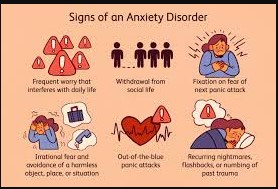Not many people understand the biology behind the onset of a generalized anxiety disorder. That is to say, many people still believe that anxiety is purely psychological.
How to Manage Anxiety
However, several scientific studies have shown that anxiety has a root in brain physiology. The living body is essentially like a very complex machine that runs on very integrated programming. Our biology is governed by varying levels of hormones, neurotransmitters, and chemicals.
The body runs normally when the levels of these substances are within the correct ranges. But what is so remarkable is our body’s ability to adapt to its environment. For example, when exposed to stressful situations, levels of the stress hormones rise. This then has a knock on effect on levels of neurotransmitters and other substances. Anxiety develops simply when the body has been exposed to too much stress too quickly. This causes the chemistry of the brain to shift and the brain to become worried about things which normally wouldn’t worry it. This phenomenon is known as generalized anxiety disorder.

There are many ways to manage an anxiety disorder. The best place to start is by modifying the lifestyle that caused it in the first place. Simple interventions such as learning meditation techniques, improving diet and taking natural supplements can vastly decrease the onset of anxiety episodes. Click here to read about a wide variety of supplements for many kinds of problems which are expertly assessed by Scams Review.
Meditation and relaxation techniques
Science had recently shied away from alternative treatments for biological problems. But scientific research has recently opened up in the area of alternative therapies and management techniques. Meditation is now a booming area for research. Researchers have now statistically linked the use of meditation with a reduction in symptoms of anxiety.
Meditation involves three simple steps. The first step is to find a quiet place where you are comfortable and will not be interrupted. This might be difficult in a very busy life, but it is possible for most people to achieve. The second step is to set a timer for 20 minutes to half an hour. The final step is to close your eyes and focus on your breathing without taking over with voluntary control.
The recommended position whilst doing this is seated with a straight posture. Mindfulness of one’s breathing should be maintained for the full time of meditation. At some point, your thoughts may begin to wander. It is important not to let these thoughts distract from the meditation and simply to return to being mindful of your breathing. Although meditation takes time, it is an important tool that can be used to enhance mental ability and thus make a person more efficient.
Diet and anxiety
Researchers have pondered the relationship between diet and the onset of anxiety. It is apparent that they both affect each other in a cyclic manner. That is to say, having anxiety can affect diet and poor dietary choices can also bring about anxiety. The two biggest dietary interventions which have shown to have a positive effect in reducing anxiety are to decrease sugar intake and improve intake of fatty acids such as omega-3 fatty acids. Modifying our daily eating schedule is probably something most people don’t think about, yet it can have such a major impact on even our mental health.
Supplementing for anxiety
In addition to using meditation and changing diet, individuals who suffer from anxiety can take natural supplements to help them manage it. There are a variety of natural supplements available which are specifically formulated for the management of anxiety as well as other supplements which support the other health interventions needed to manage anxiety.
For example, there are omega-3 supplements available to help individuals improve their intake of fatty acids. There are also supplements which help individuals to improve sleep or increase their energy levels. Taking these supplements requires little effort and time of day and are a very helpful method of managing anxiety.
Although all of the facts surrounding anxiety disorders are yet to be discovered, there have been many findings that allow us to understand how to manage anxiety disorders. The most important finding to date is probably that anxiety has an underlying physiological cause and is not simply psychological. This finding allows us to discuss simple interventions to manage such a complex disorder.











Pingback: The Physical Symptoms Of Anxiety And Trauma 2025
Pingback: How To Take Care Of Your Mental Health - Billboard Health
Pingback: How a Long-Distance Relationship Can Affect You Psychologically